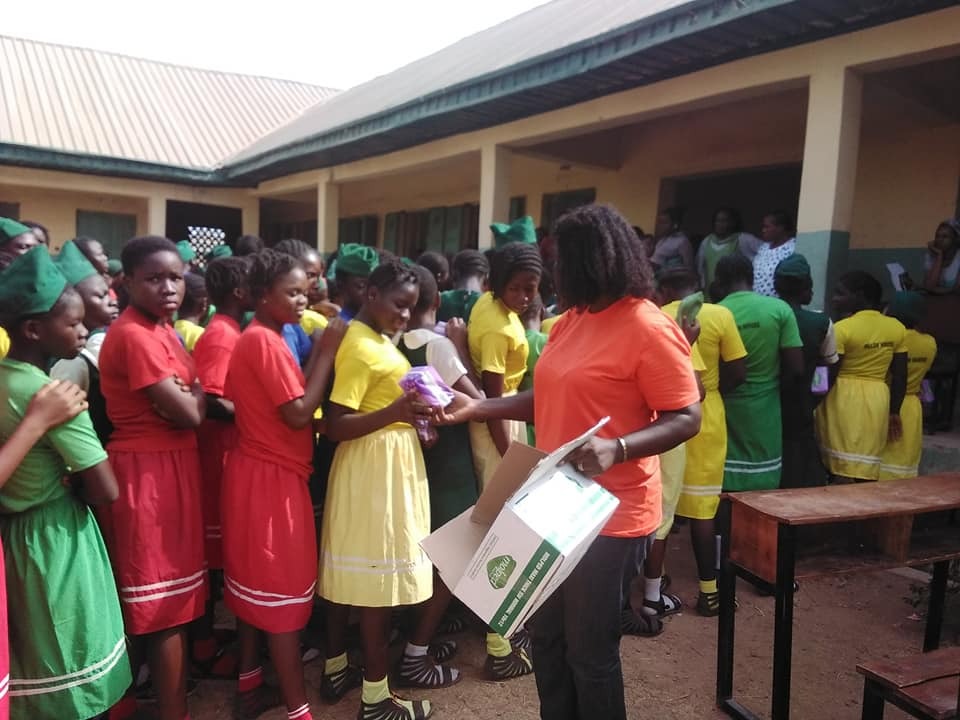One in ten girls in Sub-Saharan Africa misses school during their menstrual cycle. By some estimates, this equals as much as twenty percent of a given school year. Many girls drop out of school altogether once they begin menstruating — UNESCO
As activities continue around the world to celebrate the International Women’s Day, Pad-A-Girl-Today Project, a project under Citizen Participation Advancement and Awareness Initiative, took its campaign to the Government Junior Secondary School, Ketti in Abuja Municipal Area Council.
The project was borne out of the desire to raise awareness and educate women and girls on menstrual hygiene and health management and provision of free menstrual products.
At the event which included adolescent girls and boys from Basic 7 – 9, the Executive Director of CPAAI, Ms Fumi Olorunmola explained that the workshop was convened to avail girls valuable knowledge and skills to prepare them to manage their menstruation hygienically once they start.
Introducing the organization and project to the the exited students and staff members of the school, Ms. Olorunmola presented the event facilitators — Dr. Chioma Ebong and Dr. George Ebong, doctors who are affiliated with the Days for Girls, a charitable organization based in the United States that produces Washable/Reusable menstrual kits. Drs. Ebong are collaborating with CPAAI to provide adolescent girls access to menstrual education and sanitary products.
Although the workshop was primarily for girls, boys were included so as to build male support for menstruation, overcome taboos and engender a generation of male menstrual champions.

The participants were divided into groups: menstruators and those yet to experience the onset of menstruation. Thereafter,
- I50 (one hundred and fifty) menstruators were each given a unit of the “Days for Girls Kit”. Each kit contained the following items:
- 1 Drawstring bag to hold the components
- 2 Moisture Waterproof Barrier Shields
- 8 Absorbent Tri-fold Liners
- 2 Ziploc® Freezer Bags
- 1 Washcloth
- 2 Pairs of Panties
- 1 Travel-Size Soap
- 1 Care and Use Instruction Sheet
Participants were informed the washable and reusable menstrual kits can be used for up to three years. However, they must be washed and dried appropriately.
- Participating 118 (one hundred and eighteen) adolescent girls who were yet start menstruation were given disposable sanitary pads to keep them safely in wait for menarche or the onset of menstruation.
Amongst the number of changes the organization sought on behalf menstruating and would-be menstruators were as follows:
- School management should make it a matter of policy that MHM is a living component of the learning experience of students.
- A functional Pad Bank should be established in the school.
- Male-teacher-sensitivity and empathy towards the menstrual situation and needs of women and adolescent girls. To this end, male teachers should update their knowledge and understanding of menstruation and its related challenges including but limited to period poverty, taboos, and impact of menstruation on learning experience, attendance and participation in other school activities. It was highlighted that due to mood swings and discomforts associated with menstruation, girls might be acting in ways that appear to teachers to be abnormal during classes and other activities. Some of the times these changes in the attitude and behaviour by these girls are labelled as lack of seriousness or the desire to learn. In some cases, these girls are having their periods with discomforts but due to the silence and stigma associated with menstruation cannot open up to their teachers, especially, male teachers.
- Male teachers should therefore to break the ice by openly talking about menstruation in their lessons to embolden adolescent to open up and receive support, particularly, understanding.
- Male teachers as men in families and communities need to support women and girls through the purchase of menstrual sanitary products.
- As change agents in local communities with some advantage of knowledge, male teachers should from time to time educate boys and other men in their communities make material contribution to ending period poverty without seeking to exploit a menstruating woman or girl in need.